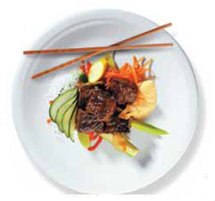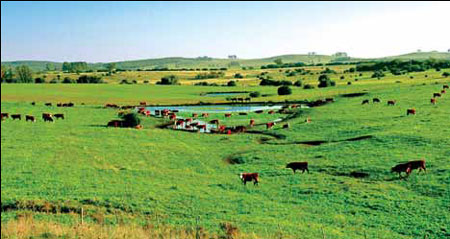Raising the standard
Updated: 2013-05-06 08:11
(China Daily)
|
||||||||
|
Uruguayan cows are among the most easily traced animals in the world. Photos Provided to China Daily |

Coming from a long tradition of natural animal husbandry, Uruguayan meat is both tasty and safe
With scare stories of processed meat products proliferating the news, and a richer, ever-increasing world population, more and more people are demanding their beef from trusted sources.
Uruguay, with its long tradition of meat production and export, is proud to support a system that guarantees its customers 100 percent traceability. The Latin American country currently exports 70 percent of its meat to more than 100 countries, with China, the European Union, North America, and Russia as its main markets.
For centuries, rural producers have applied careful humanitarian practices in the production of cattle and sheep following a harmonious and sustainable process that has been passed on between the generations.
The main cattle breeds are Hereford and Angus for beef and Corriedale for sheep.
The use of hormones, antibiotics and animal proteins in the feed of cattle and sheep is outlawed, and traceability is mandatory for every one of the country's cattle stock.
The process begins on the farm when the animal is born and continues in the industrial stage in all meat-packing plants until it is slaughtered through an electronic information system. Not only that, but Uruguayan beef is super healthy, with low levels of fat, zinc, iron, vitamin B, Omega 3 and vitamin E. Small wonder that the country's National Meat Institute (INAC), the official body responsible for guaranteeing and promoting Uruguayan natural meat abroad, actively seeks niche markets that are able to pay for this vastly superior quality product.
"The first thing I would say is that Uruguayan beef is safe," said Luis Alfredo Fratti Silveira, chairman of the INAC. "In today's climate, the public increasingly wants to know how safe the food is when they are eating and where, and under what conditions, it was processed. Uruguayan meat is extremely natural and uses applied technology that gives great confidence to the consumer.
"We haven't used hormones for 40 years, and yet that issue is still being discussed in some countries. We can provide the history of each animal, where it was born, and what its relationship was with other animals and that is a big advantage.
"From an economic perspective, we benefit from being a small country because we can carry out complex systems easily. Geographically, we have plains with gentle slopes, rather than mountains and forests. We didn't have gold and silver when the conquistadors came, and that means we have unspoilt land, full of livestock." On an international export level, the meat is certainly there for the taking. With four cows to every one of the 3.4 million Uruguayans, and each cow enjoying the equivalent of two football pitches to graze on, domestic consumption is only 20 percent of the total production, leaving 80 percent to be sold abroad.
China imports 15 percent of Uruguay's meat, and 50 percent of the giblets, but INAC is keen for it to take more, and to participate financially in the production process.
"China is Uruguay's second-largest trading partner, so the business culture is already set up," Fratti Silveira said. "We would however, like it to become our first trading partner. Internationally, our meat is doing exceptionally well. It is a gourmet food, and when it is served roasted on the bone, there is never any meat left on the plate."
At the Shanghai Expo in 2010, INAC noted that 90 percent of customers at the Uruguayan restaurant were Chinese, something Fratti Silveira is particularly proud of. "It is a myth that Chinese people do not eat much meat," he said.
The companies allowed to export to China are: Frigorfico Tacuaremb-Marfrig Group; Frigorfico Carrasco, Frigorfico PUL -a Minerva Foods Company; Frigorfico Canelones-JBS; Frigorfico Durazno, Frigorfico Rosario; Frigoy, Frigorfico Schneck; Frigorfico Casa Blanca; Frigorfico Sirsil; Frigorfico Las Moras; Frigorfico Solis Meat Uruguay; Frigorfico Lorsinal; Frigorfico Breeders & Packers Uruguay; Frigorfico San Jacinto-Nirea; Frigorfico Las Piedras and Frigorfico Pando.
With a mission to grow
The INAC is responsible for all meat processing in Uruguay, which, as well as cows and sheep, includes horses, swine, goats, poultry, rabbit, game, offal and meat products.
"We promote, coordinate and monitor the whole process: from production and processing, to marketing, storage and transportation," Fratti Silveira explained. "Our system achieved fourth place in the US's Project Management Institute's Project of the Year Awards 2009, and we have also been accredited with the ISO 27001 Certification for transparency, which is audited by the British Standards Institute.
As part of its marketing campaign, INAC has developed a unique labelling identification system, Pastures Uruguay, that flags up the product's traceability advantage. It has created themed restaurants, boutiques and other products that can be transformed into a franchise internationally and given a presence in major cities around the world.
"We want to position the Uruguayan meat chain as a supplier of quality products recognized by the control of its processes and the flexibility to adapt to consumer demands," Fratti Silveira said. "Rather than being a commodity, Urguayan meat is a product with added value. Today, we are selling at prices similar to those of Australia and the US, whereas six or seven years ago, Uruguay sold at between 20 percent and 30 percent less.

"The international market is a demanding one, and I believe that we will remain among the countries that are known for producing high quality products. That challenge will force us to keep improving and especially to continue to incorporate technology and modern methods and to carry on trying to occupy the niches that pay better such as restaurants, hotels and cruise-liners.
"Nobody wants to pay more for a product they don't know anything about, but with Uruguayan meat, the quality is clear from the taste."
Things are definitely moving in the right direction. In 2016, for example, Uruguay will host the 21st World Meat Congress. With around 1,000 attendees, the biennial congress will discuss the challenges of the meat industry, including how best to produce and sell enough meat of the quality demanded by a growing number of discerning consumers.

(China Daily 05/06/2013 page7)

 Michelle lays roses at site along Berlin Wall
Michelle lays roses at site along Berlin Wall
 Historic space lecture in Tiangong-1 commences
Historic space lecture in Tiangong-1 commences
 'Sopranos' Star James Gandolfini dead at 51
'Sopranos' Star James Gandolfini dead at 51
 UN: Number of refugees hits 18-year high
UN: Number of refugees hits 18-year high
 Slide: Jet exercises from aircraft carrier
Slide: Jet exercises from aircraft carrier
 Talks establish fishery hotline
Talks establish fishery hotline
 Foreign buyers eye Chinese drones
Foreign buyers eye Chinese drones
 UN chief hails China's peacekeepers
UN chief hails China's peacekeepers
Most Viewed
Editor's Picks

|

|

|

|

|

|
Today's Top News
Shenzhou X astronaut gives lecture today
US told to reassess duties on Chinese paper
Chinese seek greater share of satellite market
Russia rejects Obama's nuke cut proposal
US immigration bill sees Senate breakthrough
Brazilian cities revoke fare hikes
Moody's warns on China's local govt debt
Air quality in major cities drops in May
US Weekly

|

|








